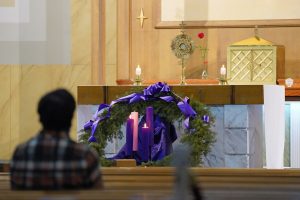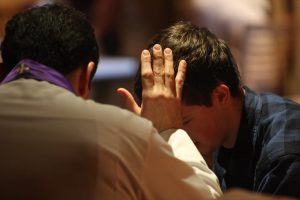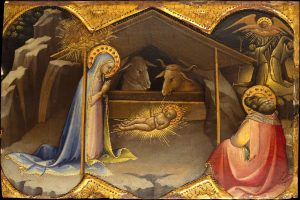I hate to stand in line. I hate to be put on hold. I hate to inch along a four-lane parkway in rush-hour traffic.
I’m a normal, busy American who’s always in a hurry to get somewhere. I have plans. I have work to do. And, like every red-blooded American hurrier, I view time in queue as time lost.
These are hard times for my sort of hurrier. It’s holiday-shopping season. The lines are longer in the stores. The traffic is worse, especially around the malls. And whenever we’re placed on hold, the phone seems to play “The Little Drummer Boy” on an infinite tape loop.
I’m just beginning to learn to thank God for these nuisances, because they’re an ideal way to spend the season.
Yes, you heard that right. Our frenetic, materialist society — through God’s providence — has evolved a month of anxious waiting before Christmas. God has given us (or at least allowed) these conditions to teach us the truth about Advent.

What is Advent?
Advent is the name the Church gives to the four-week period before Christmas. It’s a season of preparation. We prepare for the celebration of Christmas, which is a memorial of Christ’s first coming. But we also prepare our minds and hearts to await his second coming at the end of time. Indeed, in Advent, we have a great opportunity to develop certain habits of welcoming Christ into every day of our lives.
Christians have been doing this since the earliest days. Through the first three centuries of Christianity, the date of Christmas varied slightly from time to time and place to place, but one thing remained constant: the Church prepared for the great feast by a special season of prayer and penance.
Advent is to Christmas what Lent is to Easter. In fact, in some eastern churches, the spring fast is called “Great Lent” in order to set it apart from the “Little Lent” that precedes Christmas.
In Advent as in Lent, we mark the time by certain traditional practices of penance. We give things up, for example. We offer them up to God. In fifth-century France, Christians prepared for Christmas by fasting three days a week during a 40-day period. Today, the Church does not mandate a fast, but a once-a-week cutback on our food intake wouldn’t hurt most of us.
In the Mass during Advent, we do not sing or pray the “Glory to God in the Highest,” which is one of the Church’s principal acclamations of joy. Such joy we reserve for the moment of Christ’s coming — for Christmas. Yet Advent is hardly a joyless time. As our priests say in every Mass, “we wait in joyful hope for the coming of our Savior, Jesus Christ.”
We can probably work a bit at increasing our joy this season. The ancient Christians, in the middle of their Advent fast, knew greater joy than do we modern Americans — whose life, by any historical standard, is a continual feast. The ancient Christians gave up bodily pleasure so that their souls could turn, instead, to God. They fasted and feasted, all in due season, for the sake of love. Their whole life burned with the fire of that single passion: the consuming love of God.
If we sense something missing in our lives, if we lack a sense of purpose, if we struggle to find meaning in world events and personal crises, then maybe now is a good time — a time given by God — to recover the passion of our ancestors in the faith.
We’re all busy. But if you can find time in your day for a little bit of TV, radio, snacking, or web surfing, you can make time to pray. Consider the following traditional practices.

1. Go to Mass more often (and earlier)
If you go faithfully every Sunday, good for you! But maybe you can make room in your schedule to go on certain weekdays during Advent. Check the daily schedules of the parishes nearest your home. You might have to inconvenience yourself a little bit — get up an hour earlier or skip lunch. Offer the sacrifice for the sake of a friend who needs God’s help.
J.R.R. Tolkien, the author of “The Lord of the Rings,” said it best. He wrote to his son: “The only cure for sagging of faith is Communion. … The Blessed Sacrament does not operate completely and once for all in any of us. Like the act of Faith it must be continuous and grow by exercise. Frequency is of the highest effect. Seven times a week is more nourishing than seven times at intervals.”
Dressing up for the occasion can also help. We tend to dress up for important events (a job interview or a big date) and dress down for unimportant things (housework or sports). What we put on can greatly influence how we think, feel, and act. So when we go to Mass, we should take care with our appearance. We don’t need to drag out our tuxedo or evening gown, but we should at least be clean, groomed, and respectably clad.
Finally, remember to get there a few minutes early. It takes time to leave behind the busyness of the day and sink slowly into meditative worship. If you always arrive breathless as the Mass is beginning, you’ll likely spend the first half of Mass trying to catch up with the mystery.
2. Fast
Jesus fasted. The apostles fasted. We know from Scripture that fasting is a powerful form of prayer. The pope has suggested it as an effective way to bring world peace. There are many ways to fast. You can choose not to eat between meals for all of Advent. You can pick a day of the week and limit yourself to one full meal on that day. You can give up desserts. You can forego a favorite food. You can go meatless on certain days (Wednesday and Friday are traditional). Or you can choose a nonfood fast, such as TV or the Web. The important thing is to make a real sacrifice — one you can feel — and to offer it to God.

3. Pray the rosary
Praying the Joyful Mysteries is a great way to get in touch with the events leading up to the world’s first Christmas. No time, you say? If you commute to work, try praying the rosary in your car or on the bus. It sure beats talk radio. Can’t find time for the whole rosary? Pray one decade.
I have friends, a large family, who pray a decade at the end of every dinner. It spares them the effort of gathering the family together. It builds family unity. And it launches the evening in a peaceful, orderly way.
4. Do the readings
If you can’t get to Mass every day, at least read the Church’s Bible readings every day. You can find them in a missal or at www.usccb.org (choose “Bible” and then “Readings”). During Advent, the daily Scriptures focus on the longing of ancient Israel as God’s people awaited the Messiah. In the Gospel readings, we see the holy impatience of John the Baptist to prepare the way of the Lord. Remember, Advent is not only about remembering the first Christmas; it’s also about preparing for the Second Coming. The Bible will help us to take for our own the holy impatience of John, Isaiah, and King David.
5. Pray short prayers
These are ideal for the times you’re stuck waiting — for an elevator, for someone to pick up the phone, for the light to turn green. Just take a line from Scripture and pray it! Here are some you can tape to your dashboard, carry in your wallet, or keep in the top drawer of your desk.
“O Lord — how long?” (Psalm 6:3)
“Maranatha — come, Lord Jesus” (Revelation 22:20).
“He must increase, but I must decrease” (John 3:30).
“Lord, increase our faith” (Luke 17:5).
“Lord, that I may see” (Luke 18:41).

6. Make a habit of confession
Confession is another way we can make this Advent fruitful. Start to make a habit of confession. If you go once a year, it’s almost unbearable. If you go once a month, it gets easier.
The earliest text of the Mass that we possess, apart from the New Testament, is the “Didache,” which was written in Antioch perhaps as early as A.D. 60. In it we find the exhortation to “gather yourselves together and break bread, and give thanks after having confessed your sins, that your sacrifice may be pure.” The sacrifice hasn’t changed in 2,000 years, and neither has human nature. We need to shed the weight of our sins before we can hurry to the altar.
This Advent, let’s make seeking forgiveness and making things right with God a part of our lifestyle. Start examining your conscience every night. Take a couple of minutes in silence to look back on your day in the presence of God. See how well you lived up to your calling, how far you’ve gone on your way to the goal. End by telling God you’re sorry for your sins.
This is also a great time of year to make peace with someone. You know who in your life you need to be reconciled with. Swallow your pride and apologize. Or ditch your attitude and accept an apology that’s been offered to you. Making peace is one thing you’ll never regret. And doing it now will make things a little better, for you and for others, on the day you die.
7. Wait — one last thing
We can live in our anxious time as the Old Testament prophets lived in theirs. They believed in God’s promise. This faith gave them a fine sensitivity to injustice and a holy impatience for the day of the Lord’s coming. Once we’ve sanctified our impatience, we can use it to fuel our tireless work to advance the coming of the kingdom.
And maybe we can use our time in line, or on hold, or in traffic, to pray to God, or to dream up an act of charity. It’s Advent after all — and what are we waiting for?

Ninth-Century Advent hymn
May the sun and stars and land and sea
Sound forth the coming of the Most High God.
May the rich and poor unite their songs of praise
To the Son of the Supreme Creator.
He is the Savior promised to our fathers,
The glorious offspring of a virgin,
The Son of the mighty God,
Born of Him before the morning star.
He is the King of Glory,
And He is coming to rule as a God over kings,
Trample our wicked enemy beneath His feet
And heal this sick world of ours.
Let the angels rejoice.
Let all nations exult.
He that is high is coming in lowliness
To save what had been lost.
Advent prayer of the ancient churches of France (taken from the prophet Isaiah)
Drop down dew, you heavens, from above,
And let the clouds rain the Just One.
We have sinned, and we are like the unclean.
We have fallen, like a leaf,
And our sins, like the wind, have taken us away.
You have hidden Your face from us
And have crushed us by the hand of our iniquity.
Drop down dew, you heavens, from above,
And let the clouds rain the Just One.
See, O Lord, the affliction of Your people,
And send Him whom You have promised to send.
Send forth the Lamb, the ruler of the earth,
From the rock of the desert to the mountain of Sion’s daughter.
Send Him who may take off the yoke of our captivity.
Drop down dew, you heavens, from above,
And let the clouds rain the Just One.
“Be comforted, be comforted, My people.
Your salvation shall quickly come.
Why should you waste away in sadness?
Why has sorrow seized you?
I will save you.
Fear not, for I am the Lord, your God,
The Holy One of Israel, Your redeemer.”
Drop down dew, you heavens, from above,
And let the clouds rain the Just One.

